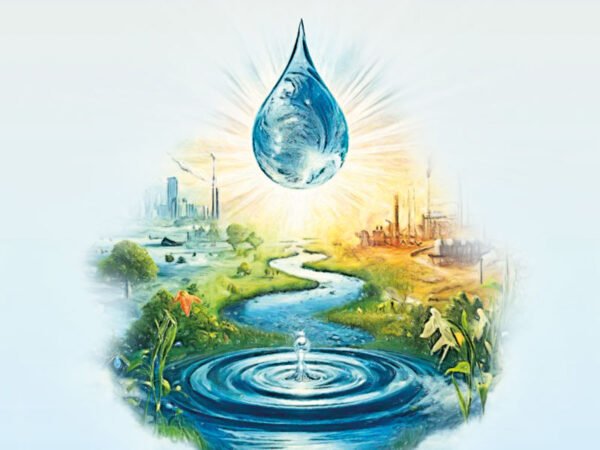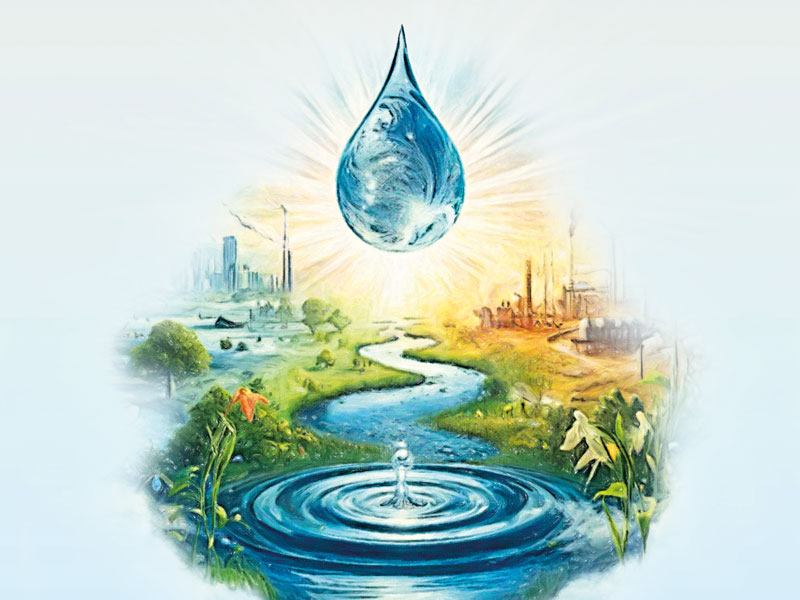

 
Author: Oliver Hackel, Senior Investment Strategist, Kaiser Partner Privatbank AG
In an age of accelerated climate change and increasing environmental stress, water is becoming an ever scarcer strategic natural resource. Water, however, is not just an elixir of life, but is also associated with natural catastrophes and geopolitical conflicts. As the granddaddy of sustainability, the water theme offers huge potential for investors. Investments in innovative water enterprises generate not just a financial return and diversification, but also a societal dividend.
Addressing environmental stress
We have an apparent superabundance of water in our corner of the world, but globally, (potable) water is a rare commodity that is becoming ever scarcer. Increasing environmental pollution caused by industrial waste, chemicals, and plastics is putting a strain on water resources around the world. At the same time, climate change is causing extreme weather events like droughts, floods, and severe storms that disrupt the natural hydrological balance and further strain an already tight water supply. Agricultural, industrial and urban overuse of water resources additionally worsens the problem and endangers entire ecosystems. These ecological challenges have far-reaching social implications.
In many developing countries, millions of people lack access to clean drinking water, which causes health risks like cholera and typhus and results in high child mortality. Women and girls particularly suffer because they often are the ones responsible for fetching water and thus miss out on educational and career opportunities.
Entire communities literally have ‘water up to their neck.’ According to the World Health Organisation (WHO), investments in clean water could prevent up to 1.6 million deaths each year. Committed governmental and corporate involvement and investment in water matters is both economically and ethically imperative.
The thirst of artificial intelligence
Water is playing an ever more important role in the technology sector. The rapid rise of artificial intelligence (AI) and cloud technologies is particularly driving up water consumption because high-performance data centres consume enormous amounts of energy and accordingly have to be efficiently cooled.
Although part of the water used to cool them can be recycled, a lot of it gets lost to evaporation. Moreover, water abstraction for data centres is often regionally concentrated, which creates additional challenges in arid areas like the US state of Arizona or parts of Spain. So, pressure is mounting on technology companies to develop more sustainable methods. Closed recirculating cooling systems, rainwater utilisation, and low-evaporation technologies are considered promising solutions for quenching AI’s thirst for water without further straining global water resources.
In addition, site selection is playing an ever bigger role in protecting water reserves. Meanwhile, investors and the public are demanding transparency, compelling companies to disclose their water consumption and to present strategies to reduce it.
Potable water from the ocean
Over 97 percent of the water on Earth is not drinkable fresh water, but is salty and unpotable. Desalination of sea water is thus widely considered one of the most promising approaches to sustainably alleviating the stress on global water resources. Advancements in areas like reverse osmosis and innovative membrane technologies enable ever more efficient treatment of salt water.
The high energy demand of desalination plants had long been a drawback, but renewable energy and heat recovery lower their consumption these days by up to 40 percent. Examples like Israel and Singapore demonstrate how quasi-autarkic water circuits can be created through a combination of desalination, sustainable water management and recycling. This can relieve traditional sources of fresh water and ease regional shortages. Rigorous research and investments in expanding these technologies in an environmentally sound way are needed to enable solutions of this kind to catch on worldwide and make water infrastructure more resilient.
Water as a growth factor
Water is a driver of economic advancement. From the food and beverage and textile sectors to semiconductor manufacturing and AI-supported data centres, virtually every industry depends on a secure water supply. The dwindling availability of ‘blue gold’ directly impacts the production capacity of entire branches of industry and can permanently slow economic growth in the regions affected. If sources of water run dry, production and economic growth stall. The OECD warns that the worsening water crisis could reduce global economic output by eight percent by the year 2050. Some developing countries could even see a 15 percent drop in economic output. Outdated water infrastructure today already causes economic costs totalling $470bn annually.
Risk factor
Water, however, is not just a growth factor, but also a risk factor. The World Bank calculates that the damage wreaked by urban flooding causes costs amounting to $120bn per annum. While builders have to ask themselves whether they want to continue building in areas threatened by water risks, insurance companies are increasingly weighing whether they still want to insure those risks in the future. For other businesses as well, water is increasingly becoming a strategic issue necessitating proactive management. Regulatory requirements are mounting, as are the penalties that loom for noncompliance. Moreover, if companies disregard sustainability in their water management practices, they also risk harming their reputation and losing the trust of investors, customers and the public.
Water – and the scarcity thereof – is also increasingly the cause of geopolitical conflicts. One example of this is the Grand Ethiopian Renaissance Dam, the construction of which is further straining the already fragile relations between Ethiopia, Egypt and Sudan because the falling water level of the Nile River threatens the livelihoods of countless people.
In Iran, in turn, persistent droughts exacerbated by decades of mismanagement are pushing people to take to the streets in mass protest while water scarcity is depopulating entire regions and fuelling social strife. Even in the US, overutilisation of the Colorado River is increasingly becoming a stress test because drastic water conservation measures are inevitable and agriculture and urban water supply networks are both reaching their limits. Diplomatic skill and foresightful policy strategies are called for to avert escalations and safeguard long-term stability.
Granddaddy of sustainability
Water can be unpredictable and immensely powerful. But humanity has also been harnessing the power of water for decades. As the granddaddy of sustainable power generation, water is compellingly convincing as a steady, dependable and flexibly deployable source of energy that does not run dry even during ‘dark doldrums’ (periods of little or no sunlight and no wind).
Hydroelectric power contributes to energy supply security and is an invaluable backbone of the energy transition. The subject of water also features prominently in the United Nations’ Sustainable Development Goals (SDGs), weaving through them like a blue ribbon due to its social, economic and environmental relevance.
Water also is explicitly mentioned in sustainability goal number six (clean water and sanitation), which unfortunately is a still a long way from being achieved. Although access to clean drinking water and sanitation is a basic human right, 2.2 billion people around the world were still denied this fundament of health and well-being in 2022.
Water is an established theme also with regard to sustainability investing. The first ‘water mutual funds’ were launched around 25 years ago. They invest predominantly in companies connected with water supply utility operation, water technology and environmental services.
The utility and industrial sectors usually make up more than 80 percent of a typical ‘water portfolio,’ which thus combines both defensive and offensive qualities and promises a good risk/reward trade-off at least on paper. However, due to the high sectoral concentration, the supposedly good risk-adjusted return comes only at the cost of having to put up with an elevated tracking error relative to the world equity market (eg MSCI All-Country World Index), and that’s if the performance promise is even kept at all.
Although active management of a thematic fund makes a lot of sense in theory because it enables one to react to subtrends and to over- or underweight fundamentally strong or weak companies, in real-world practice the majority of water fund managers do not succeed in beating the relatively simple passive water indices. Investors therefore must think about whether they have the ability to identify the best managers or should favour the more promising and cheaper alternative presented by a water ETF.
There is also a third option, though it only comes into question for active investors, and that is to discerningly pick individual water-related stocks instead of investing in a mutual fund or ETF. That way you avoid product fees, but bear the risk of active management yourself. Whatever variant an investor chooses in the end, in an era of richly valued US technology stocks, a ‘water portfolio’ not only creates a diversifying counterbalance, but may even contribute to easing an investor’s conscience.




